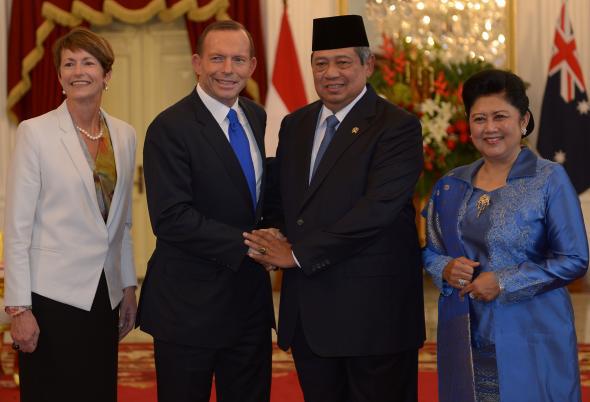Just in case you thought the NSA was the only spy agency keeping tabs on the cellphone of a neighboring country’s president, Mr. Snowden has news for you. According to the latest leak from his files, the Australian Signals Directorate tracked the cellphone activity of Indonesian President Susilo Bambang Yudhoyono, along with his vice president and several other members of his inner circle, and on at least one occasion attempted to listen to one of his calls.
Indonesia has recalled its ambassador in response. Australian Prime Minister Tony Abbot has refused to comment on the claim but says he will “never say or do anything that might damage the strong relationship and the close cooperation that we have with Indonesia, which is all in all our most important relationship.”
The latest leak comes shortly after reports that Australia was using its embassy in the country as a spy post. Responding to that story, Abbot had said, “All countries, all governments gather information. That’s hardly a surprise. It’s hardly a shock.”
It’s also true that many countries likely attempt to gather information on other heads of state. But as with the revelations of U.S. spying on the leaders of Mexico and Germany, this defense kind of misses the point. When it comes out that a leader’s personal communications have been spied on by an ostensible ally, that leader has to issue a strong response if she wants to look like she has any political independence. Yudhoyono was already on attack from political rivals at home for being too close to Australia, so it’s hard to expect him to just move on and chalk this up to the rules of the game.
The bad news is that this comes at a very sensitive time for Indonesian-Australian relations, with ongoing talks between the two leaders on the question of asylum seekers. A recent round of talks took place in Jakarta after the deaths of 36 migrants—most from the Middle East—off the coast of West Java. They were some of the thousands who attempt to reach Australia’s Christmas Island from Indonesia ever year, a dangerous journey described in a riveting recent New York Times Magazine article.
Abbot has ordered the Australian navy to step up its patrols to prevent the arrivals and would like to see boats towed back to their point of origin, a policy that Indonesia sees as a violation of its sovereignty. Talks over the issue have become quite heated at times. Abbot describe the boat issue as a “passing irritant” in Australian-Indonesian relations.
As for the refugees, they’re caught between Australia’s increasingly harsh border policies and a lack of legal protections in Indonesia, which is not a signatory to the international conventions on refugees. It’s not a simple problem to deal with, but it gets harder to address if the two primary countries involved aren’t talking to each other.
